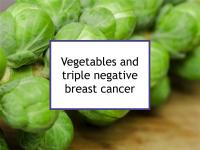The current webpage is designed to make additional research available concerning how various vegetables and vegetable components influence triple negative (ER-/PR-/HER2-) breast cancer risk, development, growth and prognosis. Below are links to studies relating to the beneficial vegetables listed in Foods to eat & avoid for triple negative breast cancer.
The following vegetables or their extracts have been tested and found specifically to inhibit triple negative breast cancer:
Cruciferous vegetables such as broccoli affect breast cancer primarily through the actions of sulfur-containing compounds such as allyl isothiocyanate (AITC), benzyl isothiocyanate (BITC), and phenethyl isothiocyanate (PEITC), in addition to sulforaphane, I3C and DIM.
Vegetable consumption also inhibits triple negative disease through the actions of various polyphenols, among them
- Apigenin (found, for example, in artichokes, bell peppers, bok choy)
- Beta-carotene (butternut squash, carrots, pumpkins, sweet potatoes)
- Cucurbitacins (cucumbers, pumpkins, zucchini)
- Kaempferol (arugula, greens, watercress)
- Luteolin (artichokes, celery, radicchio)
- Quercetin (hot peppers, onions, romaine lettuce)
Please read the applicable food webpages when making your own food lists since these pages contain important advice, food rankings (e.g., highly recommended, recommended in moderation), consumption limits, and other pertinent information.
Vegetable compounds should be obtained by eating vegetables rather than taking supplements. When a beneficial micronutrient is administered at low doses by consuming food, it is likely to have subtle chemopreventive effects, whereas the same compound administered at high doses is more likely to have pharmacological effects, with possible unwanted outcomes. For example, quercetin has been reported to reduce the effectiveness of doxorubicin chemotherapy in triple negative cells under some conditions.
